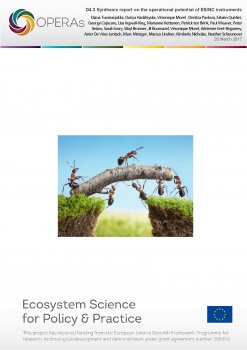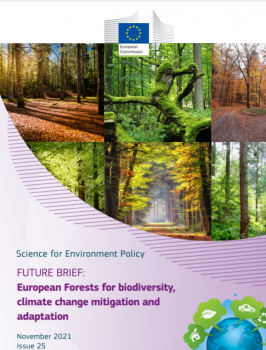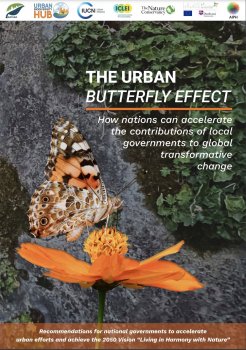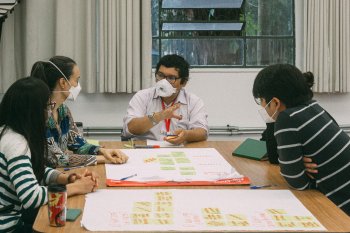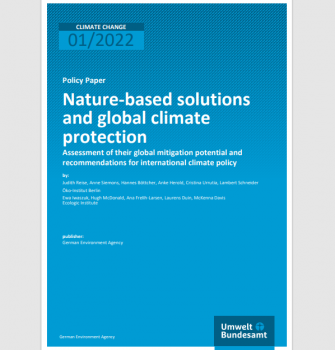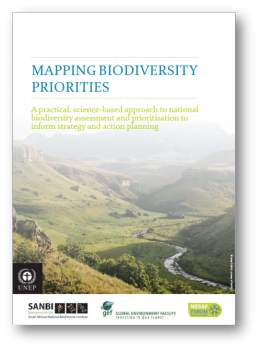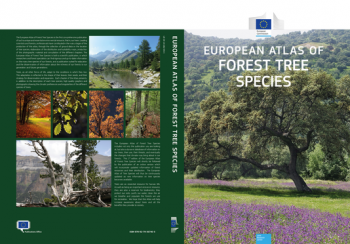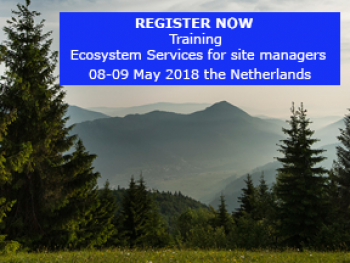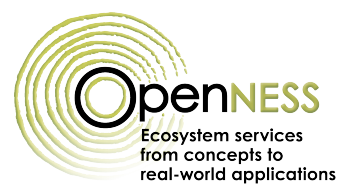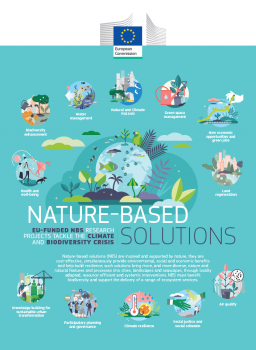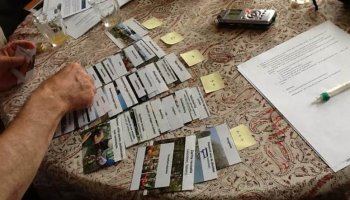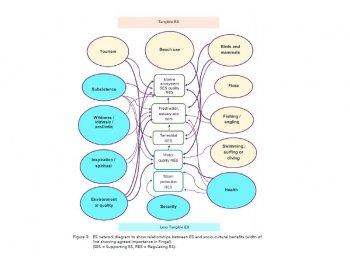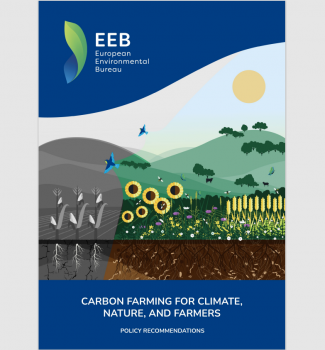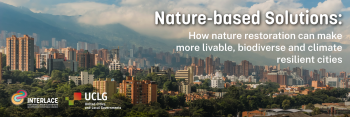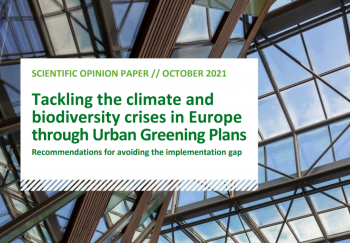Marketplace
OPERAs D4.3 Synthesis report on the operational potential of ES/NC instruments
This report is the synthesis deliverable of WP4 and thus brings together the overarching message of experiences and results of the joint WP4 Instruments work. It is aimed at those developing ES and NC instruments, or those considering funding the development of such instruments, in order to ensure
European Forests for biodiversity, climate change mitigation and adaptation
This Future Brief brings together the latest evidence on the ability of Europe’s forests to support biodiversity while removing and storing carbon from the atmosphere, while also providing ecosystem services necessary for climate adaptation and our well-being, and contributing to the bioeconomy and
The Urban Butterfly Effect
"The Urban Butterfly Effect” a policy brief with recommendations for national governments to accelerate urban efforts to help them achieve the Global Biodiversity Framework (GBF) 2030 Action Targets. This policy brief is a response to the call from the Plan of Action on Subnational Governments
Conexus key learning factsheet series - The Nature Future Workshops
The Nature Futures Workshops (NFW) were an opportunity to think as creatively as possible about the desired futures for nature in our Conexus’ cities in 2050. This factsheet presents an overview of the methods used to explore these futures. Discussions in the workshops generated a series of present
Report: Nature-based Solutions and Global Climate Protection
This Report published by the German Environment Agency critically assess the global mitigation potential of Nature-based Solutions (NbS) as provided in existing literature to derive recommendations for international climate policy. Firstly, it compares and evaluates different understanding of NbS
Belgium Ecosystem Services Network BEES
The Belgium Ecosystem Services (BEES) network is a community of practice, which connects research, practice and policy on ecosystem services and related issues by fostering exchange and real-life networking events.
Green infrastructure within agricultural landscapes strengthens the supply of ecosystem services
The brief on “Green infrastructure within agricultural landscapes strengthens the supply of ecosystem services” presents how the results from the EC21C, FarmLand, ECODEAL, APPEAL, SmallFOREST and CONNECT projects. It provides evidence that increasing landscape diversity through green infrastructure
Mapping Biodiversity Priorities
This document sets out a practical, science-based approach to spatial biodiversity assessment and prioritisation, which can be applied at the national level in any country. It is especially useful for countries that are both biodiversity rich and resource constrained, where difficult choices have
European Atlas of Forest Tree Species
The European Atlas of Forest Tree Species is the first comprehensive publication of such a unique and essential environmental resource, that is, our trees.
Training on ecosystem services for site managers
Eurosite, in cooperation with EKLIPSE, is organising a two-day short course, which will provide managers of protected sites with the necessary knowledge and steps to take in achieving Science and Policy collaboration regarding biodiversity and ecosystems services on one hand, and how to put them in
Time-use Studies Factsheet
Time use study is an innovation of the conventional stated preference techniques, in particular taken from the contingent valuation approach. In this case, the payment vehicle is expressed in labour hours rather than monetary units (use in the classical willingness to pay studies) (Kenter et al.
Nature-based solutions-EU-funded NbS research projects tackle the climate and biodiversity crisis
"Nature-based solutions (NbS) are inspired and supported by nature, they are cost-effective, simultaneously provide environmental, social and economic benefits and help build resilience; such solutions bring more, and more diverse, nature and natural features and processes into cities,
Ecosystem Services Card Game Factsheet
The ecosystem services card game is a method developed to capture the sociocultural values related to ecosystem services. This method specifically focuses on exploring and understanding human preferences and perceptions on ecosystem services (Fontaine et al., 2013). The ecosystem services card
Technical Guidance on Comprehensive Risk Assessment and Planning in the Context of Climate Change
The Technical Guidance on Comprehensive Risk Assessment and Planning in the Context of Climate Change provides orientation on how risks in the context of climate change can be comprehensively and systemically addressed through risk assessment. Decision-making, planning, and integrating
The SPIRAL synthesis report: A resource book on science-policy interfaces
This is a resource book on good practices to improve the effectiveness of existing science-policy interfaces or develop new ones. The resource book synthesises information gathered and research done throughout the SPIRAL project (‘Science-Policy Interfaces: Research, Action and Learning’). The
ES Public Consultation Methods
Abstract The concept of Ecosystem Services (ES) is relatively new to environmental policy. ES provided by the natural environment are recognised as an important contributor, directly and indirectly, to human well-being. These include the ecosystem’s provision of natural commodities (e.g. ag-
Carbon Farming for Climate, Nature, and Farmers report
The EU is promoting carbon farming as a new business model to deliver climate action in agriculture. To ensure the EU harnesses the full win-win-win potential of carbon farming, the EEB sets out the concrete solutions carbon farming should prioritise, and makes five key recommendations in this
INTERLACE MOOC on Nature-based Solutions: (7) POLICY INSTRUMENTS for mainstreaming NbS in urban governance processes
Urban areas across the globe are facing unprecedented challenges—pollution, climate change, urban sprawl—and traditional solutions are falling short. The INTERLACE project’s Massive Open Online Course showcases how nature-based solutions offer a promising approach to help create resilient,
Tackling the climate and biodiversity crises in Europe through Urban Greening Plans: Recommendations for avoiding the implementation gap
To systematically bring nature back to cities, the EU Biodiversity Strategy calls upon cities with over 20,000 inhabitants to develop Urban Greening Plans (UGP) by the end of 2021. UGP present a unique opportunity for the systematic integration of urban green infrastructures in urban planning
Report on Cultivating Cities' Challenge Workshops, Urban Morphology and SWOT analyses
The Challenge Workshop in each cultivating city was the first opportunity for different stakeholders to come together to get to know each other and to learn about GoGreenRoutes. During the Challenge Workshop, stakeholders were invited to create a vision for the upcoming seedbed and NBS
- ‹ previous
- 24 of 45
- next ›

